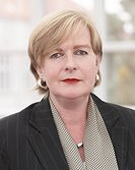Barbara Straka
Barbara Straka (born April 28, 1954 in Berlin ) is a German art historian , curator and art educator. From 2004 to 2010 she was president of the Braunschweig University of Fine Arts (HBK) and worked in art and culture management, university and science management and project management in public administration.
life and work
After studying art and German as a teacher as well as educational sciences at the Berlin University of Education (1974 to 1980), Barbara Straka completed a second degree in art history and philosophy at the Free University of Berlin (1982 to 1984).
Since the late 1970s Straka has worked as a freelance curator in exhibition projects of the Neue Gesellschaft für Bildende Kunst (NGBK), primarily in the “RealismusStudio” work group, which she took over as head in 1980 and held it until 1986 and from 1987 to 1988. Her aim was to exhibit and discuss new forms and media of political-critical art beyond the mainstream of the Berlin critical realism . She designed and organized various exhibitions for the NGBK in the 1980s and 1990s.
From 1985 to 1987 she was project manager at the Neuer Berliner Kunstverein and organized the sculpture boulevard Kurfürstendamm Tauenzien on behalf of the Berlin Senator for Culture on the occasion of the 750th anniversary of Berlin . The sculpture boulevard initially called on a conservative Berlin public and was initially controversial in the media. For some of the plants, she succeeded in securing permanent installation at the site after 1987. Today they are among the sights of the old west of Berlin . The sculpture boulevard project was awarded the Hugo von Tschudi Award in 1997 .
From 1994 to 2004 Straka was director of the Haus am Waldsee in Berlin. In her ten years as an institutional curator, she opened up the concept of the exhibition house for international art, which was founded in 1945, followed up on previous focus areas and, in some cases, carried out monographic, thematic and national exhibitions with guest curators.
As a lecturer at the University of the Arts (1993 to 1995), she conducted seminars on the subject of “Project Management and Curatorial Activities”. From 2004 to 2010 Barbara Straka was President of the Braunschweig University of Fine Arts . She headed the "Art University" as the successor to Michael Schwarz during the nationwide introduction of the Bologna reform , university contracts and tuition fees, developed a model and set up new courses and degrees based on the cross-disciplinary Braunschweig model . The university archive was founded and the basis for an art collection was laid. During her tenure, the Institute for Transportation Design was founded in 2006 , the "Art Education " course was newly established and cooperation agreements were concluded with the Federal Academy for Cultural Education in Wolfenbüttel and the Ostfalia University of Applied Sciences . She managed to position the university within the Braunschweig research landscape, in the Hanover-Braunschweig-Göttingen-Wolfsburg metropolitan region , founded in 2008, and in the Lower Saxony innovation network.
After handing over her office to Hubertus von Amelunxen in 2010 , Barbara Straka continued the work she started in the Berlin State Service in 1994 and has since worked as a consultant in the Senate Department for Economics, Technology and Research. Since 2012 she has been a consultant for the Asia-Pacific Weeks in the “European and International Cooperation” section.
Barbara Straka also works as a writer of art historical texts and as a project consultant and moderator for artists and galleries.
Web links
- Barbara Straka heads the Braunschweig Academy. In: Der Tagesspiegel , February 7, 2004
Individual evidence
- ↑ a b c d curriculum vitae ( memento from February 5, 2015 in the Internet Archive ) at the HBK Braunschweig
- ^ Former presidents on the website of the Braunschweig University of Fine Arts
- ↑ www.apwberlin.de
| personal data | |
|---|---|
| SURNAME | Straka, Barbara |
| BRIEF DESCRIPTION | German art historian, curator and art educator |
| DATE OF BIRTH | April 28, 1954 |
| PLACE OF BIRTH | Berlin |
